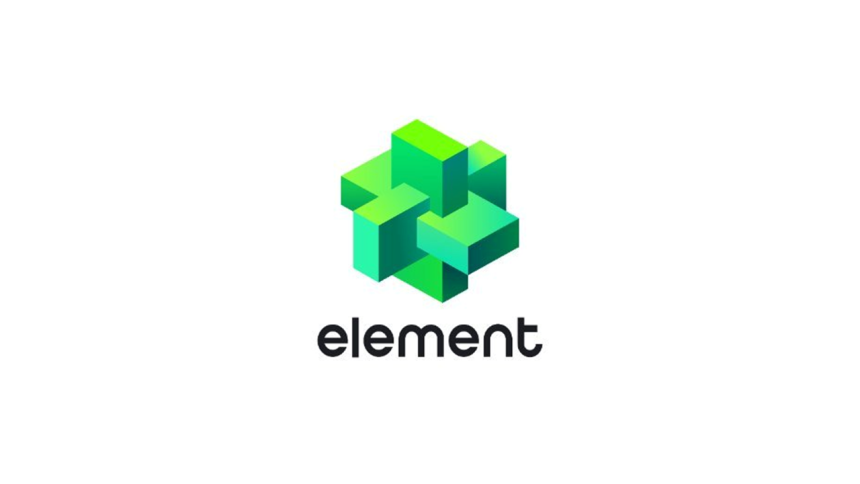Reason to trust

How Our News is Made
Strict editorial policy that focuses on accuracy, relevance, and impartiality
Ad discliamer
Morbi pretium leo et nisl aliquam mollis. Quisque arcu lorem, ultricies quis pellentesque nec, ullamcorper eu odio.
Since last year, NFT trading platforms such as OpenSea have successfully caught public attention. However, you have to know more about NFT marketplaces with better product experiences and help you earn money.
Since last year, NFT trading platforms such as OpenSea, Gem and LooksRare have successfully caught public attention, especially OpenSea, which has almost become our first entry into the NFT market. Like many others, I also learned from OpenSea, the most basic concepts of NFT market transactions such as how to mint, trade, auction, bid, and listing orders, and I gradually became a “playing master”. After half a year to now, I gradually came into familiarity with Gem and Genie, the first-period NFT aggregator, and apparently I grew more dependent on the super tool ability of the aggregator.
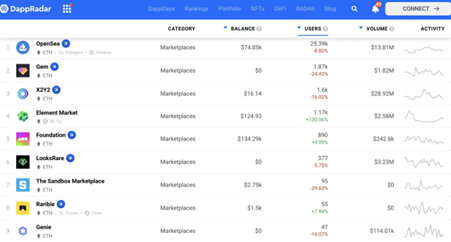
Source: https://dappradar.com/rankings/protocol/ethereum/category/marketplaces
However, recently, I have noticed one aggregator which is growing rapidly. Reviewing the recent data from Dappradar NFT, Element now has 1170 users in 24 hours, and 2.58million transaction volume. Element has already surpassed Giene, the second-largest aggregation market, and has great potential to surpass GEM. Then I went to Dune Analytics to check the transaction historical data of Element. Since April 15th, the multi-chain transaction volume of Element 2.0 has reached 143.22 million US dollars, worth 110,169 Ethereum token, and a total of 58,934 unique user addresses have completed 91,599 transactions.

Source: https://dune.com/sixdegree/element-nft-marketplace
After in-depth research, I found that, in fact, the Element product team was founded last year, it has received $11.5 million in Series A investment from first-tier capital such as Sequoia, SIG, Dragonfly Capital, Draper Dragon and Ince.
After reviewing the data and the product, here, I will give you a detailed introduction to this rising star, the first community-driven multi-chain aggregated NFT marketplace.
1. Providing users with cross-market listing and bidding through aggregation, which could fundamentally solve liquidity problems
NFT is built on the ERC721 basic protocol and has the remarkable characteristics of being non-fungible. Compared with ERC-20 similarity tokens, it is difficult to form sufficient liquidity. This is a recognized major problem in the NFT market. Therefore, whoever solves the liquidity problem will have the opportunity to be favored by traders and thus occupy more room for growth.
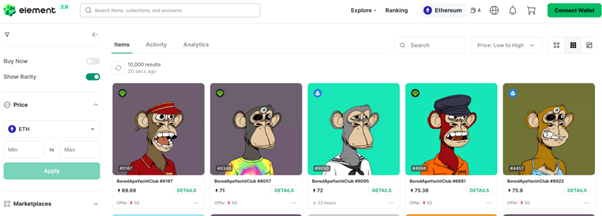
Source: https://www.element.market/collections/boredapeyachtclub
At present, Element has aggregated NFT orders in many markets such as OpenSea and LooksRare. I learned from their Discord community that Element is aggregating more order sources, like BenDAO and Bitkeep. Not only you can buy all popular NFT collections on Element now, but also you can do cross-market sales, a ape land for example:
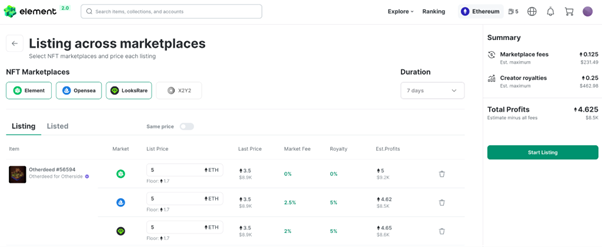
I am trying to sell a otherseed#56594 just now
2. Own to ElementEx trading protocol, users can save up to 49% of gas, and optimized tools to improve trading efficiency
2.1 Gas fee saving
When you buy and sell NFTs on OpenSea, you can just do it once a time, it will be inconvenient if you want to buy and sell many NFT pieces, especially if it is a hot collection. Meantime, if you want to buy the best price, you have to jump between different trading markets, wasting a lot of time and gas. However, if you are using Element, things go differently. In the process of using Element, it is obvious that the transaction gas is lower than that of OpenSea. By using Element, you can buy and sell many NFTs in one transaction, meantime, by using the ElementEx protocol (I have already tested), it could help you to save up to 49% transaction gas, which is 39% lower than OpenSea, and even lower than Gem.

Source: https://docs.element.market/developer
I found the reason why Element is saving so much gas, the ElementEx protocol design team is very open-minded, and they introduced it like this:
The ElementEx Protocol dev team is very open, and they introduced it like this:
- Not fully programming with Solidity. In fact, there is a certain difference in transmission cost between Solidity and assembly. The ElementEx protocol directly uses assembly for processing, which reduces the transmission cost in contract execution.
- Split ERC721 and ERC1155 contracts, and split Import entry functions such as buy, sell, basic and advanced features, which can reduce redundant calculations.
- The order status is stored in binary bits, and the fields in the order structure are multiplexed bit by bit, and the slots are reused to improve efficiency and reduce costs.
If it looks complicated, the author summarizes it into three key points, which are relatively advanced processing in reducing transmission cost, reducing process calculation redundancy and improving storage efficiency.
It is estimated that using the ElementEx protocol can reduce gas by nearly 49%, and the speed and performance of contract interaction have also improved, surpassing the Seaport protocol of industry giant OpenSea. The author deeply admires the strong technical strength of the team and the meticulous grasp of trading contracts.
The completeness of the ElementEx protocol development has expanded some features with strong tools. These features greatly simplify the operation and improve the execution efficiency in the transaction process. For example, bulk purchases, collection offers, and mixed payments, sweep mode. The dev team also provides complete OpenAPI and SDK. If you are interested in the API, you can check the relevant information https://api.element.market/openapi/. By the way, their code has already been audited by certik.
2.2 Collection Offer
I use the collection offer a lot, and I have already found low-priced NFTs through the Offer several times, but it is still a waste of time to operate the Offer one by one. When you want to buy a NFT without caring about the looks, but only the price, you can offer a valuable price and see who will take the offer. All holders could see your offer when you are doing a collection offer. It works like this:
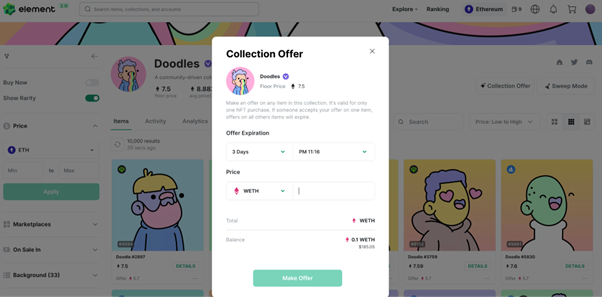
Source: https://www.element.market/collections/doodles-official
2.3 Sweep Mode
Buying in bulk has greatly facilitated the transaction process, but it is not smooth enough to use. I have experienced Element’s quick sweeping, the exquisite slider design, and the smooth floor price from low to high. Select NFTs in batches and add to shopping With one-click car purchase, the user experience is becoming more and more detailed.
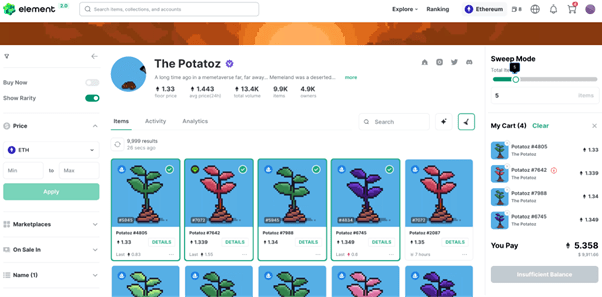
Source: https://www.element.market/collections/thepotatoz
3. Based on the full-chain data processing capability, minute-level multi-dimensional data tracking
Markets are battlefields, good deals are racing against time, and data is a signal flare. Users can easily obtain various key data indicators that are conducive to decision-making, and need complete data processing capabilities as a basis. Complete data processing flow:
- Data collection: Obtain original on-chain data from blockchain nodes;
- Data processing: Extract, transform and load raw data in the form of stream processing or batch processing;
- Data integration and analysis: The data will be aggregated and calculated, and the results of the operation will be reported and output in real-time.
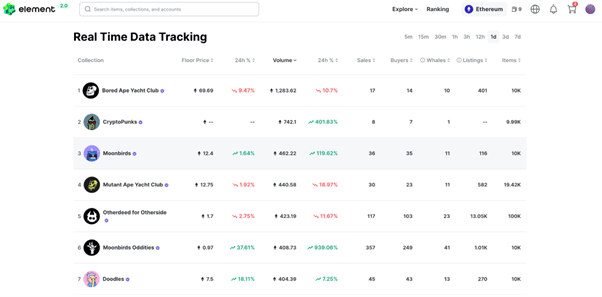
Source: https://www.element.market/ethereum
Element outputs the results of data integration, and provides real-time tracking and updating of minute-level on-chain data including transaction volume, floor price, number of buyers and sellers, number of whale positions, number of holders, and number of listing orders. What I enjoy from the data is in real time, from 5 minutes to 7 days, with real-time updates in seconds. Another point is to increase the number of whale users and the number of buying and selling addresses.
4. Visualize data charts to assist users in making investment decisions
The mining of data on the chain can bring continuous Alpha benefits. Element relies on complete data processing capabilities to provide beautiful visual data charts. In comparison, the data charts provided by other NFT trading markets are indeed too simple. But it’s still not enough, and I very much hope that the product team will work on this point.
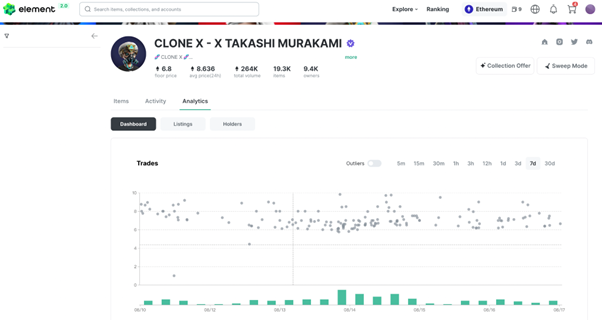
Source: https://www.element.market/collections/clonex?tag=analytics
It is found that the transaction price scatter chart of Element is a treasure data tool, which clearly shows the trend of price fluctuations, the intensive transaction area, the relationship between volume and price, etc., so as to see the corresponding pressure level, support level, volume and price deviation, rise and fall. It helps you to choose the trading time.
5. The ecological atmosphere of the community is pretty good, former OpenSea community manager Edd has already joined the team
A strong blockchain is built on the basis of community consensus. Whether it is the infrastructure layer or the application layer, even the best technologies and products need community support and contribution. On the other hand, an ideal community grows on the soil with application scenarios and continuous business development. The core team develops products, the community supports and recommends products, and product iteration relies on community feedback, and so on.
Element has such an atmosphere. The author learned through deep understanding of the Element community that community members communicated and shared enthusiastically, recommended useful tools, introduced NFTs to play new assets, and some Mods are in full swing for the conversion and support of new users.
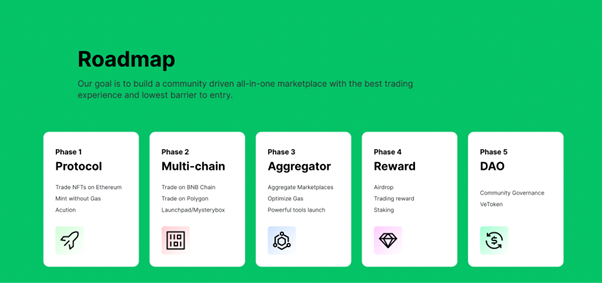
Source: https://www.element.market/
As can be seen on the homepage of the Element brand, its goal is to create a community driven all-in-one aggregated trading market, and the gradual realization of project DAO governance through Token and community governance is also clearly written in the roadmap.
Element has useful products as its foundation. Community-driven is the driving force for the sustainable development of the project ecology. In addition to proposals and voting during community governance, it can also vote for the iterative direction of Element’s functional modules. The role of the baton in ecological development. Recently, the community is eagerly looking forward to the launch of the batch order function. The Element development team responded positively and completed the function development. The community has received rave reviews from the development team.
On the other hand, community members can be incentivized for their contribution to the ecology, such as inviting new users to enter, conducting buying and selling transactions to promote liquidity and other contributors to the ecology. Continue to build community consensus and promote healthy ecological development. More importantly, I heard that they are looking for KOLs right now to start the ELE DAO.
6. Multi-chain Strategy
NFT is not only on Ethereum.
Entering the Element official website for the first time will clearly and intuitively display the integrated chain ecology, and they provide diversion pages based on different blockchain trading markets. This is significantly different from the way OpenSea integrates with several public chains such as Ethereum, Polygon and Solana. After entering a certain blockchain market, the system defaults to your next entry.
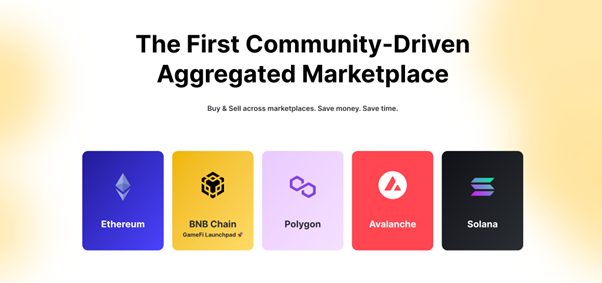
Source: https://www.element.market/
Can Element 2.0 make the next generation of aggregated marketplace?
In the 1990s, in the early days of the Internet, most Internet companies devoted their efforts to providing various website content for netizens, such as content portals such as Yahoo and AOL. There was a turbulent surge, and a large number of industrial companies and assets joined the content war, the so-called ICP era. However, at that time, two young people believed that how to allow users to “conveniently obtain content” was more important than the content itself, and founded Google with this in mind.
At present, there are only more than 1 million users who have completed NFT transactions in the world, and a very small number of top NFT projects account for the vast majority of transaction volume. However, with the continuous emergence of different types of Web3 projects, NFT, as the basic asset layer of Web3, funds and users will continue to enter, and the development space of the NFT trading market is also expanding. Just as we have witnessed the growth of cryptocurrency trading users from millions in 2017 to hundreds of millions today, we will also witness the scale of NFT trading users reaching hundreds of millions.
In this sense, the development of the NFT market is only at the beginning stage. Most trading markets are still dealing with the level of users buying and selling NFT assets, and Element is already working on how to make users “more efficient, convenient and low-cost.” Trading NFTs”, expecting Element to grow into a unicorn in the Web 3 field.
Source links:
Official website: https://element.market/
Product Documentation: https://docs.element.market/welcome-to-element/
For Developer: https://docs.element.market/developer
